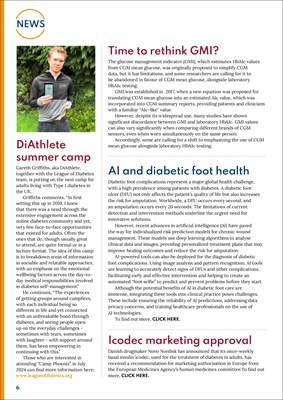
6
NEWS
DiAthlete
summer camp
Gareth Griffiths, aka DiAthlete,
together with the League of Diabetes
team, is putting on the next camp for
adults living with Type 1 diabetes in
the UK.
Griffiths comments, "In first
setting this up in 2019, I knew
that there was a need through the
extensive engagement across the
online diabetes community and yet,
very few face-to-face opportunities
that existed for adults. Often the
ones that do, though usually great
to attend, are quite formal or in a
lecture format. The idea of this camp
is to breakdown areas of information
in sociable and relatable approaches,
with an emphasis on the emotional
wellbeing factors across the day-today
medical responsibilities involved
in diabetes self-management."
He continues, "The experiences
of getting groups around campfires,
with each individual being so
different in life and yet connected
with an unbreakable bond through
diabetes, and seeing people open
up on the everyday challenges -
sometimes with tears, sometimes
with laughter - with support around
them, has been empowering in
continuing with this."
Those who are interested in
attending "Camp Phoenix" in July
2024 can find more information here:
www.leagueofdiabetes.org
AI and diabetic foot health
Diabetic foot complications represent a major global health challenge,
with a high prevalence among patients with diabetes. A diabetic foot
ulcer (DFU) not only affects the patient's quality of life but also increases
the risk for amputation. Worldwide, a DFU occurs every second, and
an amputation occurs every 20 seconds. The limitations of current
detection and intervention methods underline the urgent need for
innovative solutions.
However, recent advances in artificial intelligence (AI) have paved
the way for individualized risk prediction models for chronic wound
management. These models use deep learning algorithms to analyse
clinical data and images, providing personalized treatment plans that may
improve healing outcomes and reduce the risk for amputation.
AI-powered tools can also be deployed for the diagnosis of diabetic
foot complications. Using image analysis and pattern recognition, AI tools
are learning to accurately detect signs of DFUs and other complications,
facilitating early and effective intervention and helping to create an
automated "foot selfie" to predict and prevent problems before they start.
Although the potential benefits of AI in diabetic foot care are
immense, integrating these tools into clinical practice poses challenges.
These include ensuring the reliability of AI predictions, addressing data
privacy concerns, and training healthcare professionals on the use of
AI technologies.
To find out more, CLICK HERE.
Time to rethink GMI?
The glucose management indicator (GMI), which estimates HbA1c values
from CGM mean glucose, was originally proposed to simplify CGM
data, but it has limitations, and some researchers are calling for it to
be abandoned in favour of CGM mean glucose, alongside laboratory
HbA1c testing.
GMI was established in 2017, when a new equation was proposed for
translating CGM mean glucose into an estimated A1c value, which was
incorporated into CGM summary reports, providing patients and clinicians
with a familiar "A1c-like" value.
However, despite its widespread use, many studies have shown
significant discordance between GMI and laboratory HbA1c. GMI values
can also vary significantly when comparing different brands of CGM
sensors, even when worn simultaneously on the same person.
Accordingly, some are calling for a shift to emphasizing the use of CGM
mean glucose alongside laboratory HbA1c testing.
Icodec marketing approval
Danish drugmaker Novo Nordisk has announced that its once-weekly
basal insulin icodec, used for the treatment of diabetes in adults, has
received a recommendation for marketing authorisation in Europe from
the European Medicines Agency's human medicines committee.To find out
more, CLICK HERE.